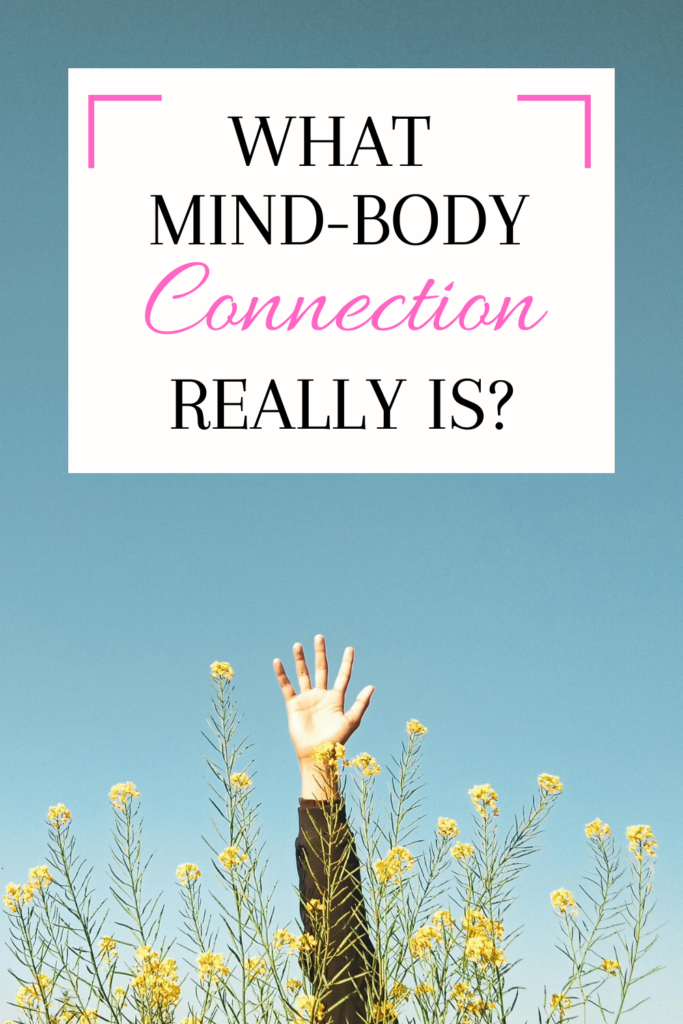The Mind-Body Connection: How Your Thoughts Impact Health


This site contains affiliate links, view the disclosure for more information.
You know that feeling when stress creeps in, and suddenly your shoulders are up by your ears?
Or when excitement floods your body, making you feel like you could run a marathon?
That’s the mind-body connection in action! Science is catching up to what many ancient traditions have known for centuries, our thoughts, emotions, and beliefs directly impact our physical wellbeing.
Let’s dive into the science behind it and explore simple ways you can tap into this power for a healthier, happier life.
1. What is the Mind-Body Connection?
In simple terms, the mind-body connection means that what goes on in your head doesn’t just stay there, it influences your entire body. Stress, anxiety, and even positive emotions trigger physiological responses and this is why it’s a core part in the holistic health approach .
The cool part? We can train our minds to promote better health rather than harm it.
Think about it
When you’re nervous, your heart races. When you’re calm, your muscles relax. Your thoughts are constantly communicating with your body, shaping everything from digestion to immune function.
Studies in psychoneuroimmunology (a fancy word for how the mind-body connection impacts the immune system) show that chronic stress can weaken immunity, while mindfulness can strengthen it.
Try This: next time you’re feeling anxious, take a deep breath and scan your body. Notice where you’re holding tension—jaw, shoulders, stomach? That’s your mind-body connection responding to your thoughts. Awareness is the first step to change!
Expert Insight:
“The connection between the mind and body is not merely metaphysical; it’s scientific. The body listens to every thought we have, whether positive or negative, and reacts accordingly.” – Dr. Bruce Lipton, Biologist and Author of The Biology of Belief
2. The Science Behind It: How Your Brain Talks to Your Body
Our brain and body communicate through an intricate system of hormones, nerves, and neurotransmitters. Here’s how the mind-body connection works:
🧿 Stress & Cortisol
When stressed, your brain releases cortisol, the “stress hormone,” which can lead to inflammation, digestive issues, and even a weakened immune system.
🧿 The Relaxation Response
On the flip side, positive emotions and deep breathing activate the parasympathetic nervous system, reducing stress hormones and promoting healing.
🧿 The Vagus Nerve
This nerve runs from your brain to your gut, heart, and lungs—playing a major role in regulating stress and emotions. Strengthening it through deep breathing or meditation can improve overall health.
Quick Tip
Practice heart-focused breathing—place your hand on your heart, inhale for 5 seconds, exhale for 5 seconds. This simple trick activates the mind-body connection and calms your system!
Expert Insight:
“By learning how to control the mind’s emotional state, we can regulate the body’s physiological responses. Positive thoughts can trigger the parasympathetic nervous system to lower stress and encourage recovery.” – Dr. Andrew Weil, Director of Integrative Medicine, University of Arizona
3. How Stress Affects Your Physical Health

Stress isn’t just an emotional experience—it has real, measurable effects on the mind-body connection. Here’s what chronic stress can do:
🧿 Increase blood pressure & heart disease risk
🧿 Weaken immune function, making you prone to illness
🧿 Disrupt digestion (hello, stomach issues!)
🧿 Accelerate aging by shortening telomeres (the protective caps on DNA)
But don’t worry—there’s good news! You can counteract stress by integrating mind-body connection techniques into your daily routine.
Try the 5-5-5 Method:
Breathe in for 5 seconds, hold for 5 seconds, exhale for 5 seconds. Repeat a few times to reset your nervous system when overwhelmed.
Expert Insight:
“Chronic stress can overwhelm the body’s ability to recover, leading to damage in every system. The beauty of mindfulness is that it can reduce this damage and reverse some of the effects.” – Dr. Jon Kabat-Zinn, Creator of Mindfulness-Based Stress Reduction (MBSR)
4. The Role of Emotions in the Mind-Body Connection
Emotions are more than just psychological states; they have profound physical manifestations within the body. Every emotion you experience, whether it’s joy, sadness, anger, or fear, activates specific physical responses, reinforcing the mind-body connection. In fact, the way you process emotions can have long-term effects on your physical health.

How Emotions Affect Your Body
Emotions and the mind-body connection are intertwined in ways that go beyond simple stress responses. When you experience certain emotions, they influence the autonomic nervous system, which controls involuntary bodily functions like heart rate, digestion, and respiration. Here’s how common emotions can manifest physically:
- ANGER
When you’re angry, your body undergoes a series of rapid changes. Your heart rate increases, blood pressure rises, and you may feel your muscles tense up. These physical changes prepare you for action—an ancient survival mechanism known as the “fight or flight” response. Chronic anger, however, can contribute to high blood pressure, heart disease, and muscle tension. - JOY
On the other end of the spectrum, emotions like joy or happiness trigger the release of endorphins and dopamine, often referred to as “feel-good” hormones. These positive emotions promote relaxation, reduce pain perception, and boost your immune system. Joy helps the body recover from stress, stimulates the parasympathetic nervous system, and lowers cortisol levels, leading to better overall health. - FEAR
Fear is another emotion deeply connected to the mind-body connection. When you’re afraid, your body enters the “fight or flight” state—your heart races, your muscles tighten, and your breath becomes shallow. This is your body’s way of preparing to escape danger. However, prolonged fear or anxiety can lead to chronic stress, which impacts the cardiovascular system, digestion, and immune health. - SADNESS/DEPRESSION
While sadness is a natural emotional response, chronic sadness or depression can have significant effects on the body. Research has shown that depression can lead to changes in the brain that affect memory, emotion regulation, and even immune function. Physical symptoms of depression include fatigue, headaches, digestive issues, and chronic pain.
Expert Insight:
“Depression isn’t just in the mind; it alters the body’s biochemical balance, leading to physical symptoms. Addressing both the mind and body is crucial in treating depression.” – Dr. Kelly Brogan, Psychiatrist and Author of A Mind of Your Own
“Anger, if not processed or released, can become a chronic stressor that triggers inflammation in the body, which, over time, can lead to serious health issues.” – Dr. Susan David, Psychologist and Author of Emotional Agility
Emotional Regulation: How to Manage Your Emotions for Better Health
The good news is that you can cultivate emotional regulation skills to better manage the mind-body connection and reduce the impact of negative emotions on your physical health. Emotional regulation is about recognizing and processing emotions in a healthy way, rather than letting them build up and manifest physically.
One powerful technique for managing your emotions is called “name it to tame it.” This simple practice involves labeling your emotions as they arise. By saying to yourself, “I’m feeling anxious,” “I’m angry,” or “I’m sad,” you activate the rational part of your brain (the prefrontal cortex), which helps calm the emotional brain (the amygdala). This process reduces the physical intensity of the emotion, helping to alleviate stress and its physical symptoms.
Expert Insight
“Emotions are energy in motion. How we manage them can dramatically impact our health. Naming emotions is one of the simplest ways to prevent them from overtaking our bodies and minds.” – Dr. Daniel Goleman, Emotional Intelligence Expert and Author
5. Mind-Body Techniques for Better Health

Looking to strengthen the connection between your mind and body? The good news is that you don’t need to make drastic changes to start experiencing the benefits. Here are some simple yet powerful practices you can begin today to boost your well-being:
✅ Mindfulness Meditation: this practice encourages you to stay anchored in the present moment, allowing you to observe your thoughts and emotions without judgment. By tuning in to your internal state, you prevent overwhelming feelings from taking charge and negatively impacting your health. Just 5 minutes of focused breath awareness can significantly reduce stress and enhance your immune system. It helps center your mind and gives you a moment of calm amidst the chaos of daily life.
✅Somatic workouts can significantly enhance the mind-body connection. These practices focus on conscious movement and body awareness, helping to release stored tension and foster emotional well-being. By engaging with somatic exercises, you can better tune into your body’s sensations, promoting relaxation and reducing the impact of stress on your physical health.”
✅ Deep Breathing encourages you to stay anchored in the present moment, allowing you to observe your thoughts and emotions without judgment. By tuning in to your internal state, you prevent overwhelming feelings from taking charge and negatively impacting your health. Slow, controlled breaths trigger the relaxation response, counteracting the stress-induced fight-or-flight mode. A few minutes of deep breathing can lower blood pressure and promote a sense of peace.
✅ Progressive Muscle Relaxation: tense each muscle group for a few seconds, then slowly release. This technique helps dissolve physical tension that may have built up throughout the day, leaving you feeling more grounded and relaxed.
✅ Guided Imagery – close your eyes and visualize a peaceful place or imagine healing energy flowing through your body. Guided imagery can help reduce anxiety, improve focus, and even promote physical healing by engaging the mind’s power.
✅ Yoga & Movement – intentional movement combined with breathwork nurtures the body’s connection with the mind, enhancing flexibility, strength, and overall vitality. Whether it’s a few minutes of stretching or a full yoga session, the benefits are profound.
✅ Physical Exercise & Sports – physical activity is one of the most effective ways to enhance the mind-body connection. Exercise releases endorphins, the body’s natural “feel-good” hormones, which help combat stress and elevate mood. Whether it’s running, swimming, dancing, or lifting weights, regular physical activity improves cardiovascular health, strengthens muscles, and supports mental clarity. Plus, sports engage both the body and mind, promoting concentration and teamwork, while reducing anxiety and depression.
Expert Insight
“Practices like mindfulness, meditation, and intentional movement are essential tools for balancing the mind-body connection. By incorporating these habits into your daily routine, you can enhance your resilience and overall health.” – Dr. Richard Davidson, Neuroscientist and Author
6. Using the Mind-Body Connection for Disease Prevention & Recovery
Can a positive mindset actually influence disease progression? Research says yes! Studies show that patients who practice mindfulness, visualization, or gratitude exercises often experience:
- Reduced inflammation
- Lower pain perception
- Faster recovery from illness
Take cancer patients, for example—those who engage in meditation or guided imagery report better quality of life and sometimes even improved treatment outcomes. And let’s not forget the gut-brain connection—your gut health affects everything from mood to immunity. Strengthening your mind-body connection can be a game-changer for long-term wellness.
Daily Practice:
Spend 5 minutes scanning your body for tension, releasing it with each breath. Visualize healing energy flowing where needed to reinforce the mind-body connection.
7. How to Build a Mind-Body Routine (Without Overcomplicating It)
You don’t need hours of meditation to see benefits. Here’s a simple way to start:
1️⃣ Morning: Do a quick body scan before getting out of bed.
2️⃣ Throughout the Day: Check in with your breath and posture every hour.
3️⃣ Evening: Wind down with a short gratitude reflection or guided meditation.
Consistency is key—start small and build from there!
Final Thoughts: You Have More Control Than You Think
Your mind-body connection is one of the most powerful tools you have for better health. By becoming aware of this connection and practicing simple techniques, you can improve your wellbeing, reduce stress, and feel more balanced every day.
So, what’s one mind-body connection practice you’re excited to try? Let me know in the comments—I’d love to hear your thoughts!
The content on Calm & Wellness is for informational purposes only and is not intended as medical advice, diagnosis, or treatment, always consult with a qualified healthcare professional
READ ALSO





19 Natural Ingredients for Hair Care That Actually Work (And Why You’ll Never Go Back)
Okay, real talk. If you’ve ever stared at the back of a shampoo bottle and felt like you needed a chemistry degree to understand it… you’re not alone. Between the sulfates, parabens, and mystery “fragrance”…
















